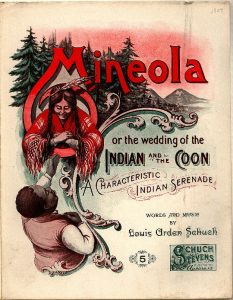Louis Arden Schuch (1876-1944) was a composer. Born in Germany, immigrated with his parents to the United States and settled in Auburn New York. He composed his problematic work titled “Mineola” in 1904. “Mineola” which translates to “pleasant place” in the Algonquian language. The piece’s alternative title is “The Wedding of the Indian and the Coon”. The piece is subtitled: “A Characteristic Indian Serenade”. The text is as follows:
Out near the town named the Needles
There lives a pretty Indian maid
She is the Pride of the Kickapoo Indian
and her skin of Navajo shade
While out way up on a vista
A Coon perchance the maid to meet
and to her he took a fancy
… every night and day
this Coon to her would say,
[chorus]
Won’t you be my Indian baby?
Love you yes indeed I do
I will make you happy, happy
Babe, now that I’ll be true
…
On the Indian reservation
Say you’ll be mine, don’t decline
the wedding of the Indian and the Coon
Told him she hadn’t thought of marriage
although she loved him heap much so
And if he expected her to Marry
To the Big Chief he would have to go
….
The ask’d what shall I say to him
In reply says dear don’t worry
have nerve drink some Tom Gin
As he said good bye that day
… to her did say
Where to even begin? Right off the bat, we have the term “coon” used to describe an African American man. This term came from the Spanish word barracón which was a large building constructed to hold merchandise, where slaves were kept for sale. This word was later anglicized into “barracoon” then shortened into the slag: “coon”. The first verse sexualizes the Native American woman emphasizing her skin tone. In the chorus begins “Won’t you be my Indian baby? Love you yes indeed I do” to be followed later in the piece by “Told him she hadn’t thought of marriage” which leads me to question motives/consent. Last but not least, the final verse mentions how the gentleman caller would need to ask the “Big Chief” referencing the Chief of that Indian tribe. Additionally, this piece says the love interest was from the Kickapoo tribe. This tribe was believed to be located in the part of the country that is now Oklahoma and Texas. I find it hard to believe that Schuch had any contact with this tribe in Auburn, NY. This piece is a whole new level of problematic. Written by a German immigrant, a love song between two people of cultures to whom the composer does not belong nor know enough about to compose a piece of music. This is just scratching the surface on how people can completely abuse traditions they are not educated on.
Work Cited
Schuch, Louis Arden. Mineola or the Wedding of the Indian and the coon. Sheet Music Consortium, Duke Music Libraries. Auburn, NY. 1904. link
Schuch, Louis Arden Jr., Find A Grave.com link
Swanton, John R. The Indian Tribes of North America. Bureau of American Ethnology, Bulletin 145. Washington DC: US Government Printing Office. 1953.

